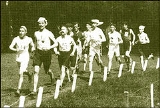
Athletics at the 1900 Summer Olympics - Men's marathon
Encyclopedia
The men's marathon
was a track & field athletics
event at the 1900 Summer Olympics
in Paris
. It was held on July 19, 1900. 13 athletes from five nations competed in the marathon, which used a distance of 40.26 kilometres.
The winner, Michel Théato
, was originally assumed to be French, before it was discovered in the late 20th century that his nationality was Luxembourgish
. The International Olympic Committee
still credits this medal for France, however.
(*) Distance was 40 kilometres
The marathon race, which began at 2:30 p.m.
on a day with temperatures reaching nearly 40°C (102°F ), wound through the streets of Paris. Thirteen runners started, though only twelve finished the four laps around the track that preceded the road running. Touquet-Daunis led until he withdrew from the competition, at which point Fast took over. Fast had tired himself trying to keep pace with the Frenchman, however, and was passed by Théato and Champion before long. Seven runners finished the race.
General
Marathon
The marathon is a long-distance running event with an official distance of 42.195 kilometres , that is usually run as a road race...
was a track & field athletics
Track and field
Track and field is a sport comprising various competitive athletic contests based around the activities of running, jumping and throwing. The name of the sport derives from the venue for the competitions: a stadium which features an oval running track surrounding a grassy area...
event at the 1900 Summer Olympics
1900 Summer Olympics
The 1900 Summer Olympics, today officially known as the Games of the II Olympiad, was an international multi-sport event which was celebrated in 1900 in Paris, France. No opening or closing ceremonies were held; competitions began on May 14 and ended on October 28. The Games were held as part of...
in Paris
Paris
Paris is the capital and largest city in France, situated on the river Seine, in northern France, at the heart of the Île-de-France region...
. It was held on July 19, 1900. 13 athletes from five nations competed in the marathon, which used a distance of 40.26 kilometres.
The winner, Michel Théato
Michel Théato
Michel Johann Théato was a Luxembourgian athlete, and the winner of the marathon at the 1900 Olympics in Paris....
, was originally assumed to be French, before it was discovered in the late 20th century that his nationality was Luxembourgish
Luxembourg at the 1900 Summer Olympics
One athlete from Luxembourg competed at the 1900 Summer Olympics in Paris, marking the first Olympic appearance by the nation.Michel Théato won the marathon event in athletics. For a long while, it was assumed that Théato was French, and only in the late 20th century it was discovered that he was...
. The International Olympic Committee
International Olympic Committee
The International Olympic Committee is an international corporation based in Lausanne, Switzerland, created by Pierre de Coubertin on 23 June 1894 with Demetrios Vikelas as its first president...
still credits this medal for France, however.
Records
These were the standing world and Olympic records (in hours) prior to the 1900 Summer Olympics.| World Record | none | |||
|---|---|---|---|---|
| Olympic Record | 2'58:50(*) |  Spiridon Louis Spiridon LouisSpiridon Louis Spyridon Louis was a Greek water-carrier who won the first modern-day Olympic marathon at the 1896 Summer Olympics, thereby becoming a national hero.... |
Athens Athens Athens , is the capital and largest city of Greece. Athens dominates the Attica region and is one of the world's oldest cities, as its recorded history spans around 3,400 years. Classical Athens was a powerful city-state... (GRE Greece Greece , officially the Hellenic Republic , and historically Hellas or the Republic of Greece in English, is a country in southeastern Europe.... ) |
April 10, 1896 (NS Gregorian calendar The Gregorian calendar, also known as the Western calendar, or Christian calendar, is the internationally accepted civil calendar. It was introduced by Pope Gregory XIII, after whom the calendar was named, by a decree signed on 24 February 1582, a papal bull known by its opening words Inter... ) |
(*) Distance was 40 kilometres
Results
| Place | Athlete | Time |
|---|---|---|
| 1 | 2:59:45 | |
| 2 | 3:04:17 | |
| 3 | 3:37:14 | |
| 4 | 4:00:43 | |
| 5 | 4:04:12 | |
| 6-7 | Unknown | |
| Unknown | ||
| — | DNF | |
| DNF | ||
| DNF | ||
| DNF | ||
| DNF | ||
| DNF |
The marathon race, which began at 2:30 p.m.
12-hour clock
The 12-hour clock is a time conversion convention in which the 24 hours of the day are divided into two periods called ante meridiem and post meridiem...
on a day with temperatures reaching nearly 40°C (102°F ), wound through the streets of Paris. Thirteen runners started, though only twelve finished the four laps around the track that preceded the road running. Touquet-Daunis led until he withdrew from the competition, at which point Fast took over. Fast had tired himself trying to keep pace with the Frenchman, however, and was passed by Théato and Champion before long. Seven runners finished the race.
Sources
SpecificGeneral
- International Olympic Committee results database
- De Wael, Herman. Herman's Full Olympians: "Athletics 1900". Accessed 18 March 2006. Available electronically at .

